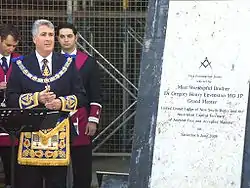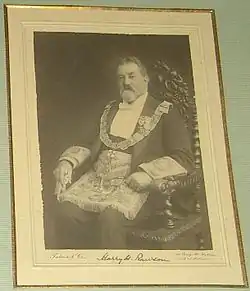United Grand Lodge of New South Wales and the Australian Capital Territory
The United Grand Lodge of New South Wales and the Australian Capital Territory is the main governing body of Freemasonry within the Australian state of New South Wales that also wholly encloses the Australian Capital Territory containing the national capital city, Canberra. It originated from the union in 1888 of the earlier 1849 provincial Grand Lodge under the United Grand Lodge of England and other district and provincial Grand Lodges of the Grand Lodge of Ireland and the Grand Lodge of Scotland.

| Part of a series on |
| Freemasonry |
|---|
 |
The United Grand Lodge of NSW and ACT building is located in Sydney. The foundation stone for the current building on Castlereagh street was laid on 15 May 1976. It was officially opened and dedicated on 10 March 1979.[1] The office tower was built in 2005. The current building houses The Masonic Museum, which is open to the public.
Organisation
The Grand Lodge is led by an elected Grand Master, assisted by a Deputy Grand Master and an Assistant Grand Master, with a Grand Team.
The Grand Lodge is further organised into 4 Regions, each led by a Regional Grand Counsellor (RGC), which are in turn organised into various Districts, led by a District Grand Inspector of Workings (DGIW), comprising groups of lodges based on geography. Lodges meet in various buildings, ranging from individual lodge buildings to major city or urban centres, such as in Canberra.
The Grand Secretary heads the administration of the Grand Lodge from the headquarters at 279 Castlereagh Street, Sydney, on the north-west side of the corner with Goulburn Street.
History
Freemasonry came to New South Wales with the regiments of the British Army soon after the First Fleet in 1788. It was banned by Governor King because of suspicions of republicanism.[2]
The first stationary lodge, The Australian Social Lodge No.260 (Irish Constitution), was established by lodges working under Irish travelling warrants that were attached British regiments garrisoning the settlement in New South Wales. Lodge No.227 (attached to the 46th Regiment) and Lodge No.218 (attached to the 48th Regiment) admitted a number of civilians to membership and assisted in the dedication of The Australian Social Lodge in August 1820. In 1824, Lodge Leinster Marine of Australia, No.266 (Irish Constitution) was formed.
The first lodge under the English Constitution was warranted in June 1828 as the Lodge of Australia No.820. The first Scottish lodge was established in 1844 in Melbourne, then known as the Port Phillip Settlement and still part of New South Wales. It was not until 1851 that the first Scottish Lodge, Lodge of St. Andrew (No.358), was established in Sydney.
The first English Provincial Grand Lodge was opened in Sydney on 10 May 1849, Bro. John Williams being the first Provincial Grand Master. The institution grew and prospered; English lodges, The Maitland Lodge of Unity No.804 had been opened in 1847, followed by The Australian Lodge of Harmony No.814 (Sydney) in 1848 and the Armidale Lodge of Unity No.865 in 1851.
The Grand Lodge of Ireland and the Grand Lodge of Scotland were also warranting lodges in New South Wales, and creating their own provincial Grand Lodges. However, there was to become a growing level of dissatisfaction with the home Grand Lodges (England, Scotland and Ireland) due to the tyranny of distance and also the amount of money being sent away from the Colony. This dissatisfaction eventually led to the establishment of the Grand Lodge of New South Wales by three Irish Lodges and five Scottish Lodges on 3 December 1877. The new breakaway Grand Lodge was not favourably received by the home Grand Lodges and was not officially recognised until the union in 1888, although it did receive recognition from a majority of the world's Grand Lodges, especially from the various jurisdictions in the United States of America.
In the following 11 years, although there was much disharmony between the three organisations, the three constitutions continued to warrant lodges and membership grew. By the time of the formation of the United Grand Lodge in 1888, the Grand Lodge of New South Wales had fifty-one lodges on its register. Following Scottish tradition, The Australian Social Lodge, being the mother lodge of masons in New South Wales, was given the number 0 on the register.
On 16 August 1888, after considerable consultation, the Masters and Wardens of the one hundred and seventy-six lodges assembled, the articles of union were again adopted, and the " United Grand Lodge of New South Wales " declared to be duly constituted and established.[3] The first Grand Master was Lord Carrington, Governor of New South Wales.
On 12 August 2015 the Grand Lodge installed the youngest Grand Master to preside over the jurisdiction (New South Wales and the Australian Capital Territory), James Robert Melville. Melville was 43 years old at the day of his installation and served as Grand Master for three years until August 2018.[4]
Notable Grand Masters

.JPG.webp)
Notable Grand Masters include:[5][6]
- 1st, The Baron Carrington (1888–1891)
- 2nd, The Earl of Jersey (1891–1893)
- 3rd, Sir Robert Duff (1893–1895)
- 4th, Sir Joseph Palmer Abbott (1895–1899)
- 5th John Remington (
- 6th, Sir Harry Rawson (1905–1909)
- 8th, The Baron Chelmsford (1910–1913)
- 9th, William Thompson
- 10th Arthur H John Goulston
- 12th, The Baron Stonehaven (1928–1930)
- 14th & 16th, Frederick Maguire (1933-1935 & 1944-1945)
- 15th, The Baron Gowrie (1935–1944)
- 20th, Sir John Northcott (1952–1955)
- 28th, Harold Coates (1980–1985)
- 29th (1985-1988)
- 30th Ronald Lewis Hale Johnson AM (1988-1992)
- 31st Noel Frederick Dunn OAM (1992-1996)
- 32nd Rev Raymond Green (1996-2000)
- 33rd George Curry (2000-2002)
- 34th, Tony Lauer (2002–2005)
- 35th, Raymond Barry Brooke (2005-2008)
- 36th, Dr Gregory Henry Levenston (2009-2011)
- 37th, 39th Derek James Robson AM (2011-2015, 2018-2021)
- 38th, James Robert Melville (2015-2018)
- 40th Lesley Norman Hicks (2021-present)
Charities
The Grand Lodge's official charities are:
- masoniCare
- Masonic Youth Welfare Fund
- The Whiddon Group - aged care facilities
- Royal Freemasons' Benevolent Institution - residential care and independent living accommodation
See also
References and notes
- "Sydney City Council Sydney Masonic Centre Inventory" (PDF).
- Franklin, James (2021). "Sydney 1803: When Catholics were tolerated and Freemasons banned" (PDF). Journal of the Royal Australian Historical Society. 107 (2): 135–155. Retrieved 27 December 2021.
- Proceedings of the Grand lodge of free and accepted masons of the state of New York, Grand Lodge of New York, 1890, accessed 2009-06-08
- Simmons, T (1 June 2015). "Our Grand Master-Elect". Freemason. 47 (2): 4. Retrieved 14 November 2021.
- "Museum of Freemasonry - Grand Masters of the UGL of NSW & ACT".
- "GRAND MASTERS of the United Grand Lodge of NSW & ACT". Archived from the original on 23 April 2012. Retrieved 25 December 2011.
Bibliography
- Cramp, Karl; Mackaness, George (1938). A History of the United Grand Lodge of NSW. Vol. 1. Angus & Robertson.
External links
- "Whatever happened to... the Freemasons" ABC's Compass TV documentary about the UGL NSW & ACT
- UGL NSW & ACT
- UGL Museum of Freemasonry - level 3, 279 Castlereagh St Sydney